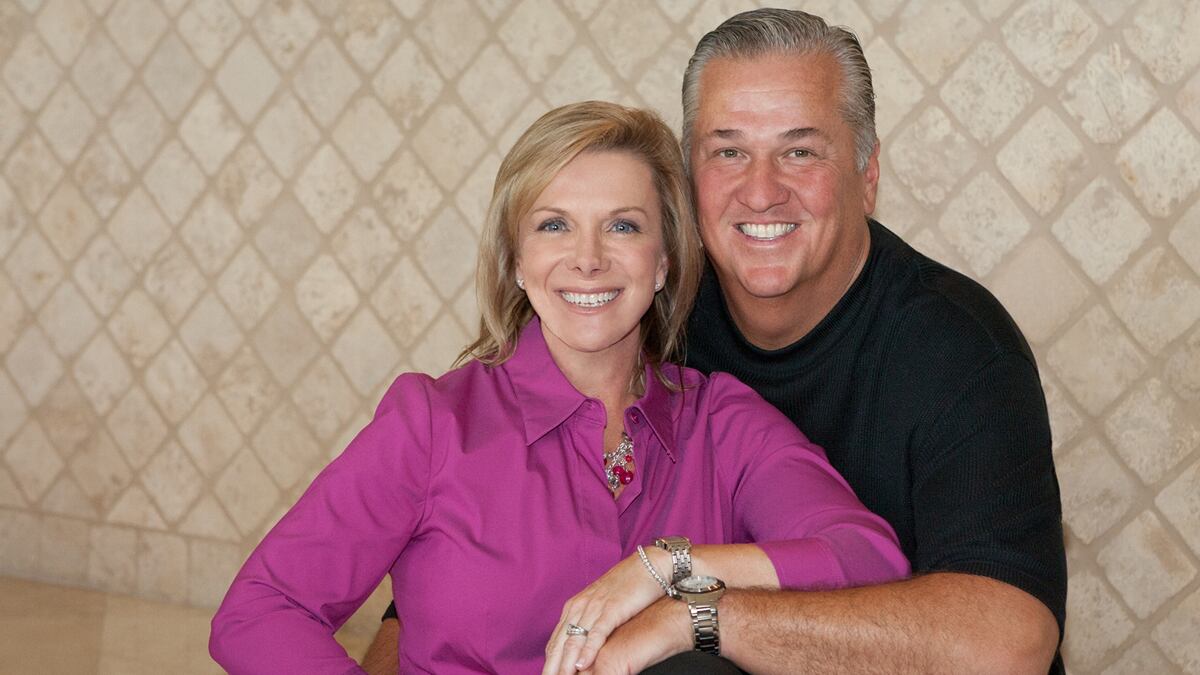Imagine, in an instant, your spouse of nearly 25 years doesn’t know you anymore. All the moments you shared together—gone. On Dec. 17, 2008, it happened to me. My husband, Scott, after slipping and falling at his office building at approximately 7 a.m., woke up with profound retrograde amnesia. In that simple accident, he lost all 46 years of his memory, including world history, the kids, his family, and me. Our marriage, our family, our life, deleted.
I was the director of marketing for my husband’s business, a private-jet management company; the mother of a son, Grant, 19, and a daughter, Taylor, 16. We lived in Gilbert, Ariz. Scott was a 46-year-old former NFL player, professional pilot, and owner of his company Legendary Jets. And suddenly, he was a stranger, a man who looked at me blankly from his hospital bed, no flicker of recognition.
With that, I became a caretaker, a medical researcher on his condition, the president of the family business, and the head of the household, all at once. I barely had time to think about whether this was forever. When we left the hospital, the doctors thought his memory would return within a few weeks, at most. So in those early days, I just tried to get through each day.
While Scott spent most of the day nursing an intense headache, I spent time putting out fires that were erupting in the business without the leader at the helm. I was fielding sales calls, trying to find passwords and other information to help the bookkeeper, going through mounds of papers. I was keeping things quiet from his competitors so business was not lost to them with news of Scott’s brain injury, which I was told would quickly resolve, and life would return to business as usual.

When Scott had breaks in the pain, we would watch TV. Just one commercial would bring up a never-ending list of questions for Scott. He would ask things like: Why are people dressed in coats and it looks cold, when we are in light clothing and there is no snow? Why do people sound and dress different then we do? How big is Arizona? How big is The United States? The world? Many times these questions would lead us to family pictures that would give some background into the world we live in and the things we had experienced together. I would show Scott on the globe that we grew up in Illinois, outside of Chicago. I would explain that there are different climates and that in Arizona, at least in Phoenix, we stayed warm and it did not snow at Christmas.
Speaking of Christmas, well, that took hours of explaining about tradition and religion. Again pictures provided some insight, but I was never too sure what he comprehended. I soon realized that Scott could only absorb so much at a time, and sometimes it would upset him to tears to realize how much he did not know. I stopped saying “do you remember when?” It was just too hard to see in his eyes the pain of not knowing things he could intellectually know that he once knew.
The kids and I gave up rather quickly on trying to jog his memory; he would become so overwhelmed with sadness if the “trigger” didn’t work. So they just tried to tell him stories to fill in the gaps. It was like a puzzle, and each piece held knowledge, historic facts, or personal memory; sometimes when doing a giant puzzle, you have to take breaks putting it together see the important areas you need to solve next. After about a month without a single memory returning, I also stopped asking each morning, “Anything come back?” Scott’s heavy, saddened face and downturned head while shaking “no” was too heart-wrenching to watch. I didn’t want him to think that he let me down by not remembering. His pain was palpable.
About a month and a half after the accident, my friends urged me to join them for dinner, and they tried to cheer me up, cajoling me. “If he doesn’t remember anything, you could really reinvent who you are,” one said. I thought about all of the bad times I could erase from my past, the chubby times and the bad perms. As the wine flowed, my friends had even more creative suggestions: “You have an amazing opportunity here. After 24 years of marriage you can reprogram HIM,” one said. “Tell him you go to the spa every Friday and you never clean the house and he always cooks.” And then, one of my friends said something decidedly unfunny: “Oh my God, what if he doesn’t fall in love with you again?”
I heard nothing else for the rest of the evening. This terrifying notion had crossed my mind before, but hearing someone else say it was paralyzing. When I got to my car that night, I sat, overwhelmed with emotion, and cried. What if he doesn’t want me anymore? What if he wants to live alone and experience the world without me? This is the kind of thing that happens in movies, not in my life.
I thought about the first time we met at a barbecue at his friend’s house in the suburbs of Chicago. Unbeknownst to me at the time, it was actually on Scott’s 19th birthday. I was set up on a blind date and so was he, but not with each other. He and I met again on campus at Northern Illinois University. Towering over me at 6 foot 4, he was an attractive pillar of strength, yet he won my heart with his gentlemanly nature and kindness, which he allowed only me to see. To the world he was this quiet, tough, driven alpha male; to me, he was everything I dreamed of in a man.
As I got to know him better, he revealed all nonnegotiable values I looked for in a mate: honesty, wisdom, security, love, humor, courage, and respect in his words and actions. We spent hours as young lovers talking about our shared morals and values, and how we wanted to live like our parents had raised us—family first. Together, we enjoyed the simple life of the college campus, walks at the lagoon feeding (and running from) the geese, bowling at the student center, and sharing cold leftover pizza for breakfast. My freshman year as a gymnast, I remember struggling to get though strenuous workouts, and then Scott would come by the gym after football practice. I knew that coy smile he gave me meant he wanted to walk me back to my dorm to study together, and my tired body would fill with anticipatory excitement.
Thinking about the longevity of our love, it was hard to believe that I would need to win back his love.
As the weeks wore on, I spent every day by his side, while working from home. Scott often expressed his frustration with his loss of emotional connection to the past. He wanted to know what he was feeling in those moments of his life that we captured in photos or on video. He was also trying to understand his role in our family. I did notice that he watched me while I moved around the house, relentlessly questioning doctors and making sure Scott was as comfortable as could be. He was affectionate toward me. But I wondered: Would I forever be just a friendly face to him, or could we once again be something more?
The thought of it tortured me. I spent hours on the phone with my mom and best friend, Karen, venting and discussing solutions to various problems that were arising. Taylor, our daughter, played a vital role in keeping me strong. We hugged each other, often sobbing, while sharing our sadness, frustration, and grief. My unspoken inner sorrows were then given to God, praying for answers, healing, and peace.
It occurred to me that I could tweak my personality to be flawless—but that would take more energy than I had, and I figured Scott had loved me once before for whom I am. Maybe it could happen again.
As the weeks at home turned into months, he and I continued each day to spend time together, eating meals and watching movies and TV shows he once liked. I told him of how silly movie lines played a role in our family, quoting Dr. Evil from Austin Powers. We had some laughs trying “new” foods that he could not remember, like Twinkies and candy bars. We laughed and cried together as he tried to remember who he was. Nothing was returning. We seemed to be only discovering more that he had forgotten.
Over the months, Scott never regained his memory. As he needed to know his world more, I thought it was vital for our relationship for me to share who I am, my emotions about things that had occurred in our past, and my thoughts about how we could get through this difficult time together. I shared details of our previous loving relationship; I showed him piles of family photos that I had saved, sorted, and stored. I wanted to fill in the lost memories and at the same time to exhibit the depth and substance of our loving life together, as well as the amazing selfless father he was to our children.
While I was creating some reality to our years together, I think I was etching in him the depth of my love for him, and he was realizing what “love” was. I don’t believe that I was reprogramming his love for me back into his heart. I believe, now reflecting on why he fell in love with me, that the fact that I kept loving and supporting him as I had always done helped, along with pure instinct. His heart began to remember what his brain had lost.
In July of 2009, Scott got a single-photon-emission computerized tomography scan, or a SPECT scan, which revealed a profound lack of blood flow to the right temple and frontal lobes of the brain where it is believed that long-term memory is stored. Doctors told us that there is little hope that his memory will return. This was a huge turning point for Scott to accept that he needed to live for the future, as he might never recapture the past.
We continue to search for answers. There are still some rough days when Scott struggles with self-identity issues and the profound loss of memories. He tells me every day that he loves me more and more, and is so happy that I stood by him. While he has changed in many ways, as we all do over the years, I am grateful that the man I fell in love with 30 years ago is still by my side. To have and to hold from this day forward, for better or for worse, for richer, for poorer, in sickness and in health, to love and to cherish; from this day forward until death do us part.





